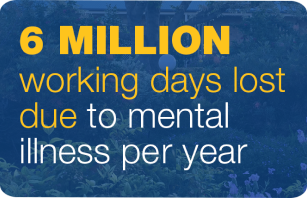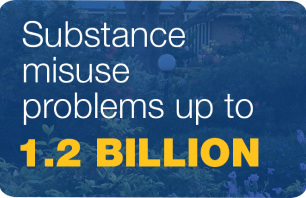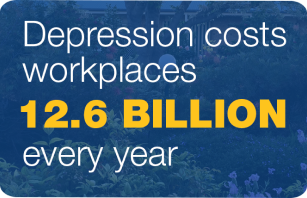YES, Implementing MHFA training programs has been proven to deliver great results for business and great results for the workforce too. The latest research is showing that companies are reaping the benefits of investing in MHFA in the form of increased productivity and reduced absenteeism.
To put a figure on this, the report prepared by Price Waterhouse Cooper shows companies achieving an average return on investment of 2.3 - meaning that every $1 you invest in MHFA you’ll see average savings of $2.30. To check out how much your business could save by investing in MHFA check out the online calculator at Headsup.
All workplaces have obligations under the occupational health and safety (OHS) and disability discrimination legislation to understand mental illness and how to talk about mental illness.
Return On Investment Calculator
Click here to see how much you will save in staff costs with the ROI Calculator



Mental Health conditions are common:
The impact of Mental Health conditions on business (measured as the total cost of absenteeism, presenteeism and compensation in any one year across industries) is estimated to be 14.9 Billion per year.
As many people who suffer from a mental health issue delay getting help, investing in MHFA for the workplace can make a real difference in employee mental health and workplace absenteeism. With leaders and managers trained in Mental Health, they can confidently encourage people to take early action and get the professional help they need to overcome their condition before it develops into a crisis.
Most people now know that mental health problems are common and disabling. As a whole, Australian workplaces lose more than six million working days a year in sick leave due to mental illness[1]. Employees struggling with mental health problems may find it difficult to maintain their usual levels of productivity, leading to presenteeism[2] and absenteeism.
Unfortunately, there may not be many people in a workplace who would know how to offer help to a co-worker who is developing depression, anxiety or a substance use issue. In other cases, a co-worker may be unsure if it is appropriate to offer help and perhaps only intervene once someone reaches a crisis, such as suicidal thinking.
Fortunately, mental illnesses often develop slowly. Given that the majority of adults spend more time at work than elsewhere, the workplace is where the early signs and symptoms of a developing mental health problem can first be noticed. With trained MHFA officers in the workplace, leaders can approach employees about mental health issues and encourage and support them to get the help they need early on before a mental health issue turns into a crisis.
1 Andrews G, Hall W, Teesson M, and Henderson S. (1999). The Mental Health of Australians. Mental Health Branch, Commonwealth Department of Health and Aged Care.
2 Defined as “employees attending work when they are unwell.”
Mental Health First Aid (MHFA) is the only international program in the workspace with published evidence of effectiveness.
By Investing in the MHFA program, your employees will know there’s always someone to turn to when they need help. All MHFA participants will be trained in how to
Mental Health First Aid is a course specifically designed for training staff in the workplace. It's having a big impact on organisations and delivering real benefits to employee productivity by way of measurable reductions in absenteeism and presenteeism (defined as “employees attending work when they are unwell.” ) for full details check out the report here LINK.
Did you know that all workplaces have obligations under occupational health and safety (OHS) and disability discrimination legislation to understand mental illness and how to talk about mental illness.
Graeme Innes AM Disability Discrimination Commissioner, Australian Human Rights Commissioner, 2010 Workers with Mental Illness a Practical Guide for Managers.
Since it began in 2000, Mental Health First Aid Australia has been committed to evaluating its training programs using rigorous scientific methods. Listed here are studies that evaluated MHFA training and have been published in peer-reviewed articles in scientific journals.
These evaluations consistently show that MHFA training is associated with improved knowledge of mental illnesses and their treatments, knowledge of appropriate first aid strategies, and confidence in providing first aid to individuals with mental illness, benefits which are maintained over time. Some studies have also shown improved mental health in those who attend the training, decreases in stigmatising attitudes, and increases in the amount and type of support provided to others.
The whole program has been developed using global research on best practise in the field of Mental Health and is continually being reviewed and developed to ensure that it delivers high-quality training and measurable results.